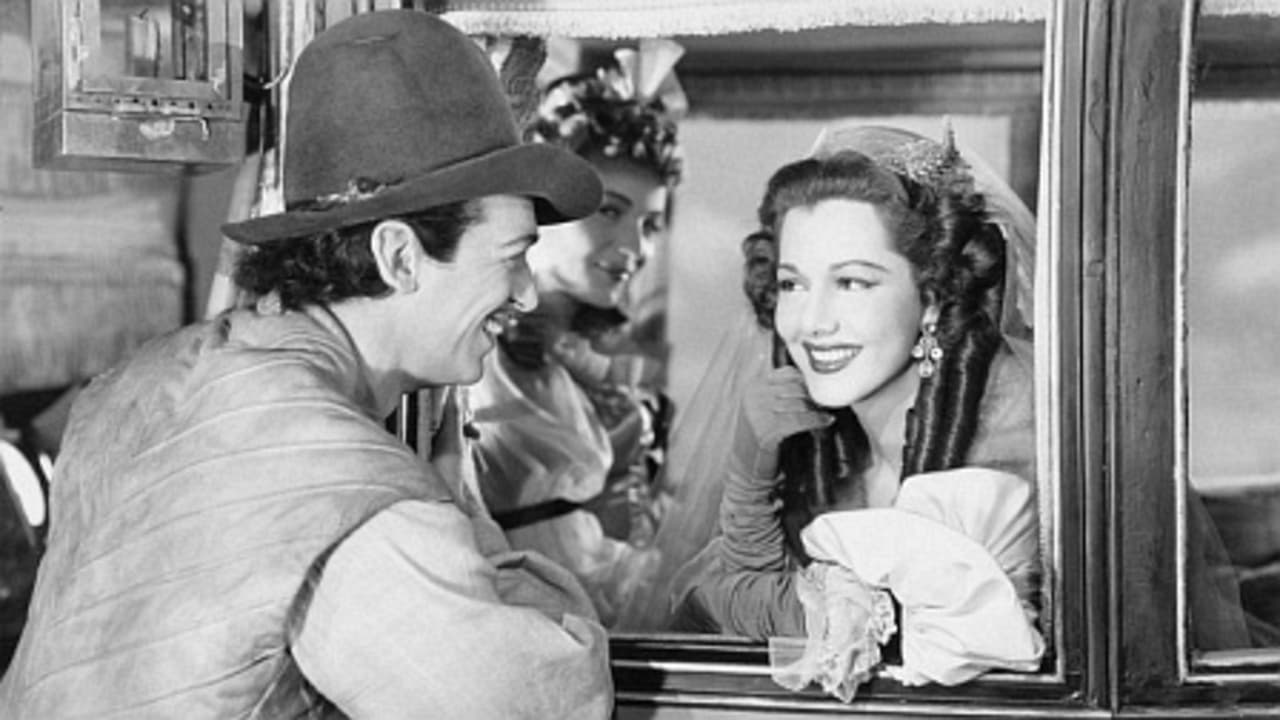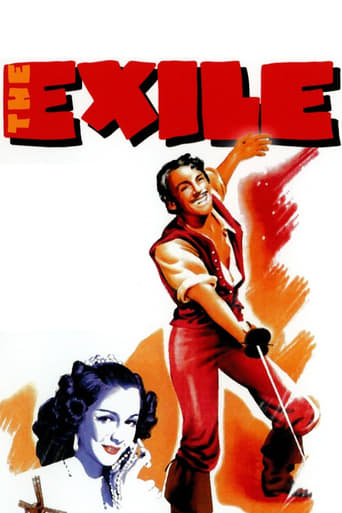

1660 and King Charles has been removed from the throne by the tyrant Cromwell,vi who never appears as a character in the film. The closest is Henry Danielle, in his usual villainous demeanor. His voice sounded like Richard Burton.The film gets bogged down with Douglas Fairbanks finding refuge in the house of a flower girl and farmer, with true love resulting.There was a guy, an actor pretending to be king, who really confuses things at certain points.The ending reminded me of "The Student Prince," where lovers must part for the king to pursue his responsibility.
... View MoreEnoyable sketch of biography and adventure. It's Max Ophul's first American movie and Douglas Fairbanks, Jr., was recently returned from honorable service in the U.S. Navy.It's well written, acted, and directed. It's about the exiled King Charles II, Fairbanks, and his temporary refuge in Holland before being restored to the throne of England.Let me see if I've got this straight. I don't want to have to dig it up in Wikipedia. It's the early 1600s. The Roundheads, under Oliver Cromwell, have taken over England lopped off the head of Charles I, Fairbanks' father, and routed Fairbacks himself. This Cromwell had lots of passion and warts. He cleaned things up his own way, disenfranchising the Cavaliers who supported the King.Cromwell died and, as often happens when a charismatic figure disappears, there were great arguments over what would happen next, who was the next ruler of England. The true test of a government's viability comes not when one man or party is in power, but when that power must be passed on. The Sunni and Shi'ite still haven't figured it out.The Cavaliers are generally thought of as adventurous, honorable, militaristic, individual aristocrats. There were several kinds of Roundheads, ranging from the oppressive and punitive Pilgrims to the pacifistic, egalitarian and humble Quakers. The Cavaliers believed in personal achievement, the Roundheads in the community. The Roundheads settled New England (Plymouth was the last port they'd touched in England), while the Cavaliers settled the South (see Charleston or the Carolinas, named after the King).In this movie, Fairbanks' Charles II is the honorable hero who finds satisfaction as a bus boy in a Dutch Inn. (Holland was a commercial and cultural force to be reckoned with at the time.) He falls for the pretty blond who hires him knowing nothing of his background.But the Roundheads are hunting for him and they're led by Henry Daniell at his most villainous -- flat black hat, black clothes, black cape, all symbols of their difference with the more colorful and flamboyant garb of the Cavaliers. Boy, is Daniell menacing.He and the other Roundheads, bent on eliminating the throne once and for all, want to lop off Fairbanks' head too, despite his fairness and his popularity back home. They fail. There is a spectacular sword fight in and around a Dutch windmill -- exciting but not nearly as well done as those in, say, "The Mark of Zorro" or "Scaramouche." Fairbanks must give up his fair-haired Dutch girl friend when he becomes king. He loves her and wants to marry her, but she has her responsibilities back in Holland. Who will take care of her tulip garden? (The viewer is permitted a slight chuckle here.) "I will treat these memories as roses," murmurs Fairbanks, "and put them in a box. I will come to you in dreams." It sounds better in Fairbanks' reading than it looks in print.Not bad, overall. A throwback to the black-and-white studio-bound films of the 1930s, with Tyrone Power or Errol Flynn as the hero.
... View MoreIt was the second time Ophüls had broached an historical subject .In France 1939, he filmed the tragic love story of Franz Ferdinand and Countess Sophie Chotek ,of course a misalliance,hence a Morganatic marriage.As it did not happen as Charles Stuart was concerned ,the lovers are left with memories ("I'll visit you in your dreams").If it weren't for the last minutes ,the film would not be a real Max Ophüls (spelled "Opuls") movie.The last third is a bit Curtizesque ,Douglas Faibanks Jr recalling Erroll Flynn.This is certainly a good film ,but it cannot be included in the director's best works such as "Liebelei" "La Signora Di Tutti" "Letters from an unknown woman" or "Madame De" .This is fictionalized history -whereas "De Mayerling A Sarajevo" depicted real events- where the round heads (the Puritans) ,dressed in black nicely play the parts of the villains against a noble hero dressed in white .There are good lines ;I particularly like this one "If I ever come home,I shall belong to no party" .Another good moment: "He lives in luxury and idleness" say the Puritans (a picture shows the "farm worker" plowing;"He must be ready to kill" (the man and his girl see the new-born chicks ) Maria Montez is the "star" of the film but her appearance does not exceed ten/fifteen minutes .It's Holland as we imagine it: windmills (with an impressive duel ),tulips ,canals,fair-haired girls ...
... View MoreWhen Douglas Fairbanks, Jr. started his career in silent screen he did not go for the swashbuckling roles that his famous father did. My guess is he wanted to be judged on his own as a player. In fact it was his mother who when Fairbanks, Sr. was slow with the child support who got him into film in the first place, hoping to capitalize on the name. Later as he got older and was established in his own right, Fairbanks made claim to the legacy of his father in such films as The Exile.In fact Fairbanks both wrote the screenplay and produced this film and got European director Max Ophuls for the piloting. He plays a most famous exile, Charles Stuart, Charles II of Great Britain who is exiled in the Netherlands and poised to reclaim his own in 1660.The story is based on a historical novel by British writer Cosmo Hamilton and it tells of that brief interregnum in British history between the sudden death of Oliver Cromwell and the restoration of Charles II. Charles Stuart had narrowly escaped from his country after the Puritan takeover and was living in exile in somewhat humble circumstances wherever in Europe he could find shelter. In 1660 it was the Netherlands.Historians have debated long about the collapse of the military dictatorship of Lord Protector Oliver Cromwell. He had things pretty much his own way and when he died his son Richard wasn't up to the job he inherited. It was a close run thing that the United Kingdom did not break apart into civil war again at this time.By 1660 just about everybody except the most committed of Puritans felt that only a Stuart Restoration would keep the country united. But some of those most committed Puritans had a big vested interest in seeing that the Restoration did not occur. Therein lies the tale of this film.Douglas Fairbanks, Jr. is a perfect Charles Stuart, in fact he looks quite a bit like him. As in real life sharing his exile is Lord Clarendon who is played here by Nigel Bruce. When Charles reclaimed his throne, Lord Clarendon became his first minister. In the film as in life Clarendon was constantly reminding him of his duty and not to spend all his time on frivolity and chasing skirts. In real life after the action of this film, Charles got rid of Clarendon, but with a decent pension for loyalty and services rendered.As petitions come from various folks over in Great Britain to resume the monarchy, Charles plays coy all the time dodging Puritan agents. Several have come to the town where he's staying and Charles has a bit of sport with them by just pretending he's a penniless exile. He even takes a job as a laborer on Paula Corday's farm. He even falls for her as he did with MANY women.But a most cunning and ruthless Puritan in the person of Henry Daniell arrives to take over the hunt and kill the king before he can set sail back to his realm. This is one of Daniell's finest performances on screen, you can believe he's one cold and merciless killer and a true believer in the Puritan Revolution. Fairbanks and Daniell have a duel in a Dutch mill that's the equal of the one Errol Flynn and Basil Rathbone had in Robin Hood.As per her contract Maria Montez got top billing as a French countess who finds Charles Stuart as a farm hand and delivers a message of support from his cousin Louis XIV of France. Robert Coote has a very funny part as an unemployed actor who is passing himself off as Charles Stuart and who the Puritans nearly kill for such a good performance. Fairbanks uses Coote to his own end to further his deception, but steps in when Daniell's about to run him through.The Exile is one of Douglas Fairbanks, Jr.'s finest films and he really does the part in a way that would have made Dad proud.
... View More